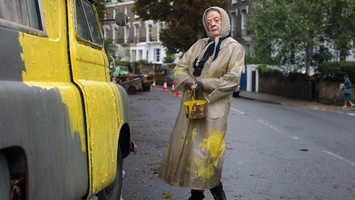
I went to see the Lady in the Van this week. It wasn't at all what I expected. I had seen excerpts on television and thought of it as a comedy, something to lighten the load and enjoy a good laugh. It has funny moments but in fact it's a very moving film which has left a lasting impression on me. It says a lot about an unfulfilled life and the tragedy of being driven by fear and guilt.
Mary Shepherd is running away from an accident which an opportunistic and immoral policeman persuades her is her fault and blackmails her for years. She can't forgive herself and constantly seeks forgiveness and consolation in the confessional box but is oppressed by dreams of the accident and the regular appearance of the policeman who seems to find her no matter where she is. Where she is and where she was for fifteen years was in Allan Bennet's drive, in a van, overflowing with all her belonging, many of them religious artefacts. Her hygiene left much to be desired but Allan Bennet put up with this, with seeming resignation, accepting her presence, sometimes cleaning up after her and stopping her from being moved from one place to another.
This is a true story and it's remarkable how Allan Bennet cared for her. He has said that he didn't really like her, she just happened and he let her stay. I don' t think he sees this as particularly self-sacrificing but it was an intensely human thing to do and while Allan Bennet would say he is not religious he expressed for me what religion is about or should be about. Sometimes I hear religious people beat themselves up because they think they should be better than others, that being Christian, for example, means loving or caring or serving in a way that's beyond what anyone would do - I'm not inconveniencing myself enough, I'm not Christian enough in that I'm not self-sacrificing enough. What a burden to bear. I'm not sure I'm in to that kind of self-sacrifice, the kind that comes from living up to an ideal of how we think we ought to live. But I am in to the self-sacrifice that comes from love and there's plenty of that around. Everything has a cost and loving relationships express themselves in many ways. Just think of parents looking after their children, especially those with disabilities, children looking after ageing parents, friends supporting and going out of their way to help one another, people doing voluntary work, engaging in all sort of justice and peace projects, visiting prisons, opening their homes to
refugees etc etc. But any one of us can only do what we can do - try to be loving, accommodating, supporting wherever life places us and whatever it throws at us. It's a wonderful thing to be fully human, to enter into the joys and sorrows of life with love and compassion and a glorious thing to be ordinary. For me religion is about making us more human, celebrating that humanity and certainly not sacrificing it for some higher ideal. I'm not expecting to be better than others because I'm a Christian. I'm hoping that my Christian faith and practice helps me in the struggle to be fully human, to be in a good relationship with myself, God, others and the world in which we all live. And sometimes those relationships will demand sacrifice but one that flows naturally from that interconnectedness and care for others.
Mary Shepherd suffered from the ideal of self-sacrifice. In her former life she had been a gifted and celebrated pianist, even playing at the Proms. But she had entered a convent and was asked to sacrifice her piano playing for the sake of God and prayer. A difficult scene for me was when as a young novice she was playing the piano and a senior nun comes along and slams down the lid. No room for developing one's talents here, only self-sacrificial prayer. This was definitely an ideal of the past - deny yourself for the sake of some supposed higher good, fight against selfcentredness. Conform to a way of life that was supposed to be liberating and self -fulfilling but often had no understanding of God given talents or giftedness. Nowadays we have come to our senses and realise how important it is to develop our talents and gifts and how personal and human development is at the heart of true spirituality. Mary left the convent but she had internalised those ideals and in her flight from fear of being apprehended for an accident that wasn't her fault opted out of ordinary living. She couldn't even bear to hear music because it was obviously too painful. A wasted life? No life is wasted but certainly an unfulfilled one, one that seemingly was oppressed by a religious ideal. She lives on, however, immortalised in Allan Bennet's play, with a message for many of us. After all St Iraneus did say that the Glory of God was man (and woman too of course) fully alive. Not to live as humanly and fully as possible is perhaps the greatest heresy of all.


 RSS Feed
RSS Feed
